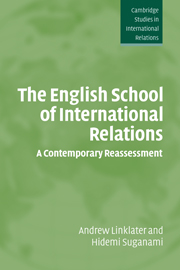Book contents
- Frontmatter
- Contents
- Acknowledgements
- Introduction
- 1 The idea of ‘the English School’ as a historical construct
- 2 The argument of the English School
- 3 The English School on ‘International Relations as an intellectual pursuit’
- 4 Progress and its limits: system, society and community in world politics
- 5 Cosmopolitanism and the harm principle in world politics
- 6 The sociology of states-systems
- 7 The good international citizen and the transformation of international society
- Conclusion
- Bibliography
- Index
- CAMBRIDGE STUDIES IN INTERNATIONAL RELATIONS
5 - Cosmopolitanism and the harm principle in world politics
Published online by Cambridge University Press: 22 September 2009
- Frontmatter
- Contents
- Acknowledgements
- Introduction
- 1 The idea of ‘the English School’ as a historical construct
- 2 The argument of the English School
- 3 The English School on ‘International Relations as an intellectual pursuit’
- 4 Progress and its limits: system, society and community in world politics
- 5 Cosmopolitanism and the harm principle in world politics
- 6 The sociology of states-systems
- 7 The good international citizen and the transformation of international society
- Conclusion
- Bibliography
- Index
- CAMBRIDGE STUDIES IN INTERNATIONAL RELATIONS
Summary
Wight (1991) maintained that rationalism was the via media between realism, which argues that states are condemned to take part in relations of competition and conflict, and revolutionism which believes in the possibility of replacing the states-system with a form of world political organization which realizes the ethical ideal of the unity of humankind. He claimed that rationalism went beyond realism which underestimated the importance of international society but it also superseded revolutionism which committed the opposite offence of overestimating the prospects for the progressive transformation of world politics. Wight argued that the ongoing conversation about international relations would be impoverished without the revolutionist's continuing protest against the moral deformities of world politics. On this argument, rationalists should remain open to the revolutionists' claims about the moral imperfections of the international states-system while steering clear of their naively utopian solutions.
A group of scholars who aim to understand the foundations of international society and who share some of the realist's pessimism about the prospects for ending violent war must nevertheless deal with the revolutionists' criticism that sovereign communities can progress beyond international society by agreeing on the means of giving political expression to the ancient ideal of the universal community of humankind. It is no surprise then that leading members of the English School have been especially interested in their visions of global political progress (Wight, 1991; Bull, 2002: part 3).
- Type
- Chapter
- Information
- The English School of International RelationsA Contemporary Reassessment, pp. 155 - 188Publisher: Cambridge University PressPrint publication year: 2006

